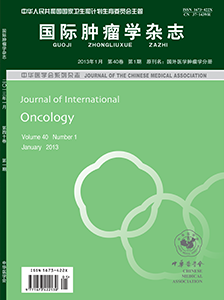Mechanism study of PD-1/PD-L1 in tumor and its value of diagnosis and treatment of thyroid cancer
引用次数: 0
Abstract
Programmed death-1 (PD-1) and programmed death ligand-1 (PD-L1) are involved in the regulation of immune checkpoints and are closely related to the occurrence and development of tumors. In thyroid cancer, an increase in PD-L1 expression and an increase in PD-1 positive T cells may be predictive of higher invasiveness and a greater risk of recurrence. Anti-PD-1/PD-L1 therapy has had significant effects in many tumors, but the efficacy in thyroid cancer is still relatively limited, which also requires finding biomarkers those can better predict the efficacy. Further understanding of the mechanism of PD-1/PD-L1, the current research status in thyroid cancer, and biomarkers related to its efficacy may provide new treatment methods and ideas for patients with thyroid cancer. Key words: Thyroid neoplasms; Immunotherapy; PD-1/PD-L1PD-1/PD-L1在肿瘤中的作用机制研究及其在甲状腺癌诊治中的价值
程序性死亡-1 (Programmed death-1, PD-1)和程序性死亡配体-1 (Programmed death ligand-1, PD-L1)参与免疫检查点的调控,与肿瘤的发生发展密切相关。在甲状腺癌中,PD-L1表达的增加和PD-1阳性T细胞的增加可能预示着更高的侵袭性和更高的复发风险。抗pd -1/PD-L1治疗在许多肿瘤中都有显著的疗效,但对甲状腺癌的疗效仍然相对有限,这也需要寻找能够更好预测疗效的生物标志物。进一步了解PD-1/PD-L1的作用机制、在甲状腺癌中的研究现状以及与其疗效相关的生物标志物,可能为甲状腺癌患者提供新的治疗方法和思路。关键词:甲状腺肿瘤;免疫治疗;PD-1 / PD-L1
本文章由计算机程序翻译,如有差异,请以英文原文为准。
求助全文
约1分钟内获得全文
求助全文

 求助内容:
求助内容: 应助结果提醒方式:
应助结果提醒方式:


